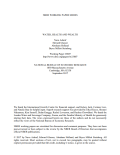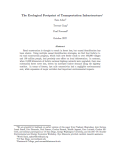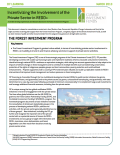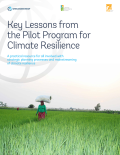

Road construction is thought to result in forest loss, but causal identification has been elusive. Using multiple causal identification strategies, the authors find that India's rural road construction program, which built new feeder roads to over 100,000 villages and 100 million people, had precisely zero effect on local deforestation. In contrast, when 10,000 kilometers of India's national highway network were upgraded, there was substantial forest cover loss, driven by increased timber demand along the highway corridor. In terms of forests, last mile connectivity had a negligible environmental cost, while expansion of major corridors had important environmental impacts.

The report "Harnessing the Potential of Productive Forests and Timber Supply Chains for Climate Change Mitigation and Green Growth" evaluates opportunities for harnessing the potential for climate mitigation and green growth in the forest sector. The analysis focuses on mitigation benefits related to carbon storage in planted forests, harvested wood products (HWP), and the substitution of materials. This emphasis on the role of forestry in climate mitigation in developing countries fills an analytical gap—until now, the role of the productive forest sector has largely been ignored. In addition, the analysis quantifies the climate change adaptation benefits of investments in the HWP supply chain, such as creating economic opportunities and increasing resilience.
Under current conditions, the supply of HWP is unlikely to keep up with expected demand. Increasing economic and population growth in the study countries will drive greater consumption of HWP. Without making the recommendations suggested in this report, increasing consumption will result in large HWP supply gaps.

The Forest Investment Program (FIP) is one of three strategic programs of the Climate Investment Funds (CIF). FIP provides developing countries with scaled-up financing to plan and implement readiness reforms and public and private investments, identified through national REDD+ readiness or equivalent strategies, while taking into account opportunities to help adapt to the impacts of climate change on forest ecosystems and to contribute to multiple benefits such as biodiversity conservation, protection of the rights of indigenous peoples groups and local communities, poverty reduction and rural livelihood enhancements.

"Key Lessons from the Pilot Program for Climate Resilience" is a practical resource for all involved with strategic planning processes and mainstreaming of climate resilience.
This resource helps countries bolster the resilience of their infrastructure, natural resources and human development programs, to the effects of climate variability and change. The experiences presented come from the first 7 years of implementing the Pilot Program for Climate Resilience (PPCR) in 18 countries and covering sectors including agriculture and landscapes, water resources, coastal zone, urban development, climate information systems, and other infrastructure.
The top 10 Key Lessons from the PPCR highlight critical and strategic aspects that need to be considered in resilience planning and implementation. These lessons underscore the importance of institutional arrangements; information on climate vulnerabilities; leveraging finance; transforming at scale; engaging stakeholders; dedicated learning fora; engaging private sector; core indicators and monitoring; responsiveness to country context; and where relevant regional programming.
